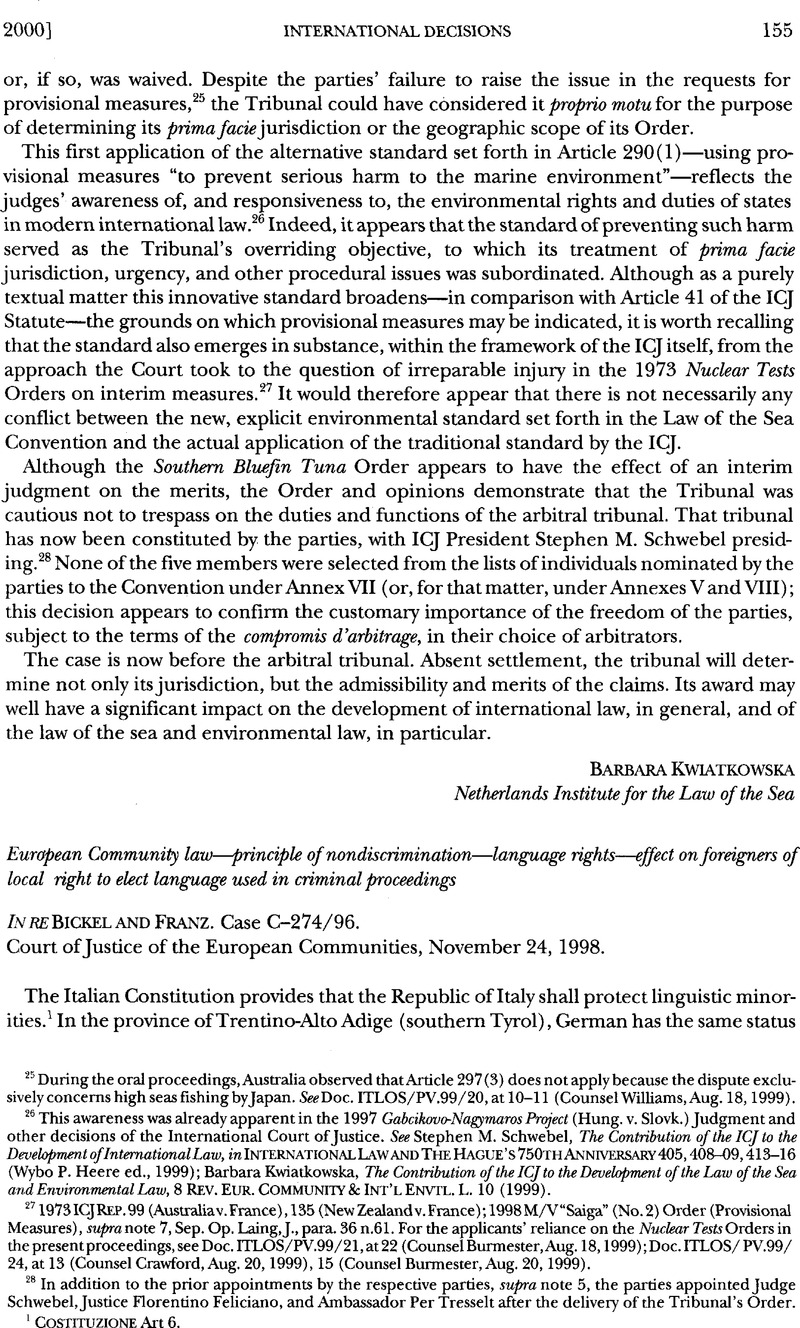No CrossRef data available.
Published online by Cambridge University Press: 27 February 2017

1 Costituzione Art 6.
2 Presidential Decree No. 670/1992, Art. 99.
3 Id., Art. 100.
4 Bolzano District Magistrates’ Court.
5 Article 234 [177] of the Consolidated Version of the Treaty Establishing the European Community, October 2, 1997, reprinted in 37 ILM 56 (1998) [hereinafter Treaty], provides for referral of preliminary questions concerning EC law to the European Court of Justice (ECJ) by domestic courts of member states. Treaty citations are to the Consolidated Version (Treaty of Amsterdam), with bracketed references to article numbers in the Treaty Establishing the European Community, March 25, 1957, 298 UNTS 11 (Treaty of Rome). Since the ECJ issued its decision prior to the date that the Treaty of Amsterdam went into force (May 1, 1999), the Court's Judgment exclusively uses the article numbers from the Treaty of Rome.
6 Case 274–96, Judgment, para. 12 [hereinafter Judgment]; see also Opinion of the Advocate General Jacobs, para. 10 (March 19, 1998).
7 Treaty, Art. 12 [6].
8 Judgment, para. 14 (citing Case 186/87, Cowan v. Tresor public, 1989 ECR 195, para. 10).
9 Treaty, Art. 49 [59].
10 Judgment, para. 15 (citing Cowan v. Tresor public, para. 15).
11 Id.
12 Id., para. 16. In this remark, the court appears to be applying to an administrative and judicial context the general but unamplified statement with which it opens its consideration of the first part of the question (see text accompanying note 6, supra): “The first point to note is that in the context of a Community based on the principles of freedom of movement for persons and freedom of establishment, the protection of the linguistic rights and privileges of individuals is of particular importance (Case 137/84 Mutsch [1985] ECR 2681, paragraph 11).” Id., para. 13.
13 Id., para. 27; the ECJ refers here to its decision in Kalliope Schöning-Kougebetopoulou v. Freie und Hansestadt Hamburg, Case C–15/96, 1998 ECR 1–47, para. 21.
14 This argument was put forward by the two applicants and was not contested. See Judgment, para. 30.
15 See, e.g., Vessoso and Zanetti, Case C–207/88, 1990 ECR I–1461.
16 Sabine Gleß, Comment, NStZ/Neue Zeitschrift für Strafrecht, June 1999, at 315 (comment on ECJ case C–274/96, Nov. 24, 1998, concerning the priority of community law over national laws of criminal procedure).
17 Id. at 316.
18 Convention for the Protection of Human Rights and Fundamental Freedoms, Nov. 4, 1950, 213 UNTS 221.
19 See Peter Bal, Discourse ethics and human rights in criminal procedure, in Habermas, Modernity, and Law 71 (Mathieu Deflem ed., 1996).
20 See, e.g., D.J. Harris et Al., Law of the European Convention on Human Rights 252, 270–72 (1995). In a 1989 decision, the European Court of Human Rights held that where Italian authorities lacked evidence to support their assumption that the applicant was capable of understanding Italian, they had to presume that he did not understand the language because he so asserted and was neither a national nor a resident of Italy. Brozicek v. Italy, 167 Eur. Ct. H.R. (ser. A) (1989).
21 See Corte. cost., Jan. 29, 1996, Sentenza No. 15, Giur. Cost. 1996, 1, 140.
22 See Dieter Grimm, Does Europe Need a Constitution?, 1 Eur. L.J. 282 (1995); Jürgen Habermas, Die Einbeziehung des Anderen 185 (1996).